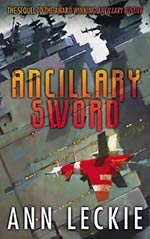
![]() attackofthebooks
attackofthebooks
6/10/2015
![]()
Ancillary Sword is the second in Ann Leckie's Imperial Radch series and the sequel to Ancillary Justice. Picking up chronologically almost immediately after the events of that book, it follows Breq, the once ship, but now the last remaining ancillary of her ship, as she is given command of a ship and sent to resolve problems in a star system under the Imperial Radch rule. Within moments of arrival, it's clear that something is awry, but exactly what is a mystery.
There is a distinctly different feel to the story her from Ancillary Justice. So much of the excitement over the first book seemed to be how Ann Leckie blew the top off conventions of perspective in how she told the story, using Breq as a personality split over many bodies as the narrator. With Ancillary Sword, Breq is confined to just one remaining body, her ship destroyed, and while she is able to jump her awareness to many the perspectives of those under her command instantaneously, it is not the same thing. Further, the story itself is structured differently, her motives are different, and her goals changed. It results in a completely different feel, one that is, in many ways, more conventional than Ancillary Justice.
The change isn't necessarily a bad one, but Leckie doesn't really seem to provide that wow factor that carried Ancillary Justice. Her characters are flat, her protagonist is not compelling or sympathetic, and I wasn't really sure that I felt the injustice that was supposed to be resolved. Sure, there was an underworld of repressed citizens on the space station and down the well, but their repression is never developed into something that felt personal. I might have been reading something out of a travel log by a socially conscious journalist for all the depth that the oppressed demonstrated. In some respects, this may be an outgrowth of Breq's nature as a ship, an artificial intelligence shoved into a physical body, but the effect is one that while occasionally interesting is ultimately lacking in sympathy and emotion, even when Leckie goes into excessive detail about every feeling and motivation that Breq is experiencing.
In some respects, it's an excess of tell over show that dulls the credibility of Breq's experience. Breq never really faces significant obstacles and strides through Radch colonial civilization like a demi-god, demanding, and receiving, the results she desires.
This observation about the nature of the colony raises some other concerns I had. At 600 years the colony is still facing the same prejudices as integration by the Radch? Given the level of technology the Radch and their citizens utilize, this strains credibility and marks one of the deficits in a lot of science-fiction writers repertoire--an appreciation or understanding of anthropology and human cultural evolution. We may buy that civilization in the Star Wars universe remains relatively static for millenia, but we don't come to it with a promise of social change and justice the way that Leckie does in her novels. As a result, the sudden changes that Breq forces upon Athoek's governors and people seem out-of-place and forced. Would change really have been static for 600 years? For a comparison, consider that it 600 years ago, Columbus had not discovered America--or been born, most of the world was feudal, peasants lived in wooden huts, fought with bows and arrows and swords, traveled by horse, and had a life expectancy of 30. Meanwhile, Radch citizens were conquered by space ships, had access to artificial intelligence, and lived in space stations. And social change has been static for 600 years? Perhaps this is Leckie's point--something has been retarding the change, but I didn't get that impression. Rather, it felt like an excuse for Leckie to write a metaphor for social change imposed by powerful individuals on repressing social groups to the benefit of the huddled masses.
Yes, the heavy-handedness of it all. Leckie's actually much lighter with her hand than others, but because the tale lacks in other ways, the social message seems to drive the story more than the story driving the social message. It hurts her effort, and I think diminishes Ancillary Sword's potential.
Ancillary Sword has been nominated for the Hugo for Best Novel. I don't have any problem with that, per se. It's a decent follow up to Ancillary Justice, even if unsatisfactorily so. However, I suspect that, because it was not on the Sad or Rabid Dogs slate and because Ancillary Justice received the Hugo last year, it will receive the bulk of the votes from those who are revolting against the Sad and Rabid Puppies slates. This is unfortunate, because there are better books that have been nominated this year (for example, The Goblin Emperor, review forthcoming) and that deserve attention. But are the Hugos about quality science-fiction and fantasy any more or just a platform for the promotion of petty political agendas?
http://www.attackofthebooks.com/2015-hugo-nominee-ancillary-sword-by-ann-leckie/